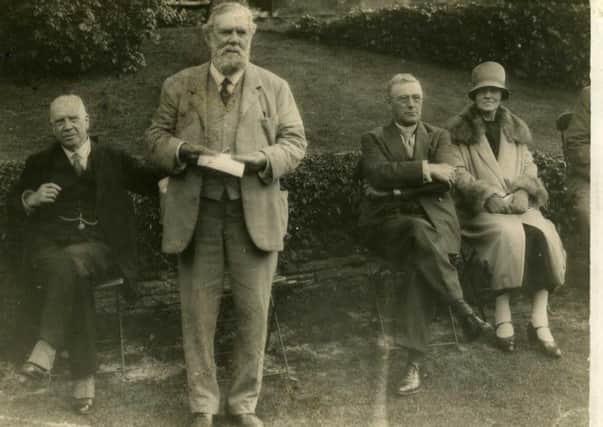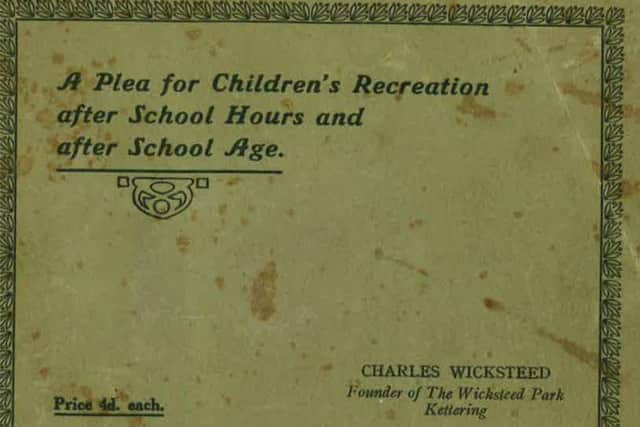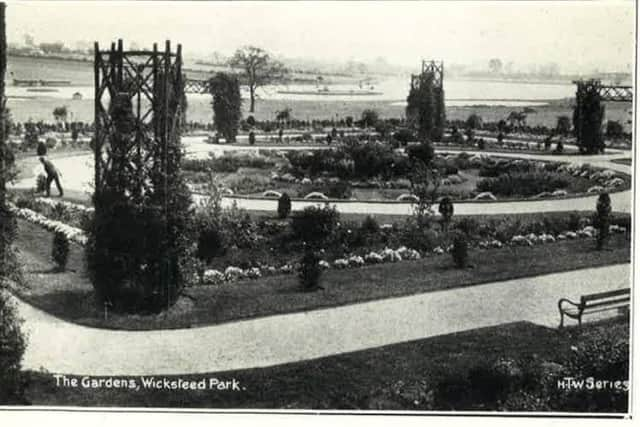Blueprint behind Wicksteed Park in Kettering to be republished


A Plea for Children’s Recreation after School Hours and after School Age was first published in 1928 and was the work of Charles Wicksteed, the creator of swings and slides as we know them today.
He founded Wicksteed Park in Kettering in 1921 as part of his vision to inspire and encourage play as part of families’ health and well-being.
Advertisement
Hide AdAdvertisement
Hide AdThe play equipment invented by Charles meant Wicksteed Park quickly became one of the most popular parks in the country and an inspiration for providing fun and relaxation that has been copied many times since.


His visionary book has now been re-published, after being found in the park’s archives, to mark the centenary of the Wicksteed Charitable Trust, which he set up to run the park after his death.
Proceeds will help the trust to fund a reproduction of the iconic first slide in the park; a structure that was to change the history of children’s play forever.
In his book Charles proclaimed: “I have good reason to believe that the park I have formed has changed the lives for the better, to a greater or lesser extent of thousands of children.
Advertisement
Hide AdAdvertisement
Hide Ad“I have direct evidence from mothers how whining, pale-faced children, complaining of any food they get, have come back with healthy faces and rosy complexions, ready to eat the house out after a good play in the playground.”


Charles also explained how he began manufacturing the children’s play equipment, which was later to be exported around the world, completely by chance.
He said: “We had a Sunday School treat in the park and put up primitive swings with large poles, tied together at the top with chains.
“Fortunately they were not cleared away with the other things the day after the treat and I ultimately found them so popular that instead of pulling them down I added more.
Advertisement
Hide AdAdvertisement
Hide Ad“But these were not enough for the children, I found them piling up forms one above another on a slope under a tree to form a slide.”


The book reveals that at first Charles made separate slides for boys and girls before realising that separating the sexes was not a good idea.
He explained: “I thought I would make a slide: first for the boys.
“This was so much appreciated that I made a better one for the girls: the boys got jealous of this, so I made a still better one for them.
Advertisement
Hide AdAdvertisement
Hide Ad“At that time I had a quaint idea that the boys and girls ought to be separated.


“This has been entirely and successfully abandoned, as also any idea of keeping or limiting the playthings to people of a certain age.”
Soon, Wicksteed Park was crammed with every kind of play apparatus imaginable, much of which invented by Charles.
He was clear that he did not have regulations in his park, nor did he make distinctions between users.
Advertisement
Hide AdAdvertisement
Hide AdHe added: “Let people of all ages and both sexes be admitted; the older ones then take care of the young people.
“It appears to me to be very cruel to keep out boys and girls because they are a little bit too old, I have seen the poor little things go away crying. Why should you separate a family?”
This in turn removed the necessity for physical boundaries, saving money as “railings around a playground and attendance being very expensive.”
Oliver Wicksteed, chairman of the Wicksteed Charitable Trust and Charles Wicksteed’s great grandson, said: “Wicksteed Park has played such a massive part in the lives of generations of people, both from the town and wider afield, that it is sometimes easy to forget what a unique and innovative place it is – a true jewel in our midst.
Advertisement
Hide AdAdvertisement
Hide Ad“The story of the park and the man behind it has had a huge impact, not just locally, but in the whole way we treat parks and children’s play as a nation and this book is an extremely important document in the history of children’s play.
“Before then, public parks were typically very formal places, where children were warned to keep off the grass.”
Wicksteed Park Managing Director Alasdair McNee added: “Charles envisaged a place to amuse young people and families and encourage them to enjoy unrestricted outdoor play.
“The joy the children got from his primitive swings and slides pushed him on to create more and more play equipment.
Advertisement
Hide AdAdvertisement
Hide Ad“Soon, Wicksteed Park was crammed with every kind of equipment imaginable, much invented by Charles and his innovative company.
“His swings and slides were soon being exported and enjoyed by children in parks and playgrounds across the world.
“It offered children the opportunity to play freely and safely on the newly-invented equipment.
“Families could also taste the outdoor life together and all ages enjoyed swimming, paddling and boating.
“Today it is fair to say Wicksteed Park remains the home of child’s play. Charles would have wanted it no other way.”
To buy the book, go to www.wicksteedpark.org/the-wicksteed-charitable-trust/.